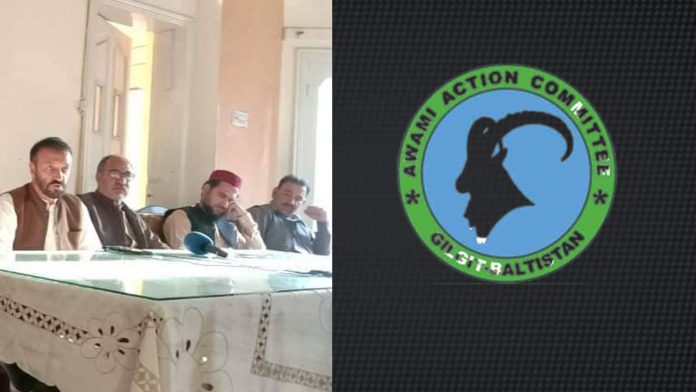In a recent press briefing held by the Awami Action Committee in Pakistan-occupied Gilgit-Baltistan, the committee highlighted the pressing issues faced by the region and demanded urgent reforms to address them.
Gilgit-Baltistan, an area currently under dispute, was the focal point of the Awami Action Committee’s briefing. They asserted that Khalsa government did not hold a single inch of land. They said that the principal interest is the use of natural resources in Gilgit-Baltistan. They demanded that any institution or department that is now occupying these resources return them to the people as soon as possible. They highlighted that ratification of cabinet’s land reform bill is highly critical.
The briefing highlighted the dismal performance of the Pakistani government in providing essential services to the residents of Pakistan occupied Gilgit-Baltistan. Skardu, for example, is dealing with significant challenges such as 23 hours of load shedding,lack of water in Degree College, Skardu, and the rejection of admission of 700 students in both Womens’ Degree College and Degree College, Skardu. In addition, hundred female students have been denied entrance. The Public Action Committee Gilgit-Baltistan, Anjuman-e-Imamia Baltistan, and Hetabang Nala Plan extended their unwavering support to address these challenges.
The Awami Action Committee stressed the need for immediate recruitment of unemployed youth for the Diamar Dam project and compensation for its victims. Furthermore, they proposed that unemployed youth should be hired in the police force to replace the Frontier Corps (FC) and Rangers who are now stationed in the region.
The committee also called for municipal elections, which have been neglected for fifteen years, to safeguard the rights of the youth and the general public. They extended the support concurrent elections in Pakistan occupied Gilgit-Baltistan and Islamabad to prevent election rigging by the Minister of Kashmir Affairs and Gilgit-Baltistan.
The briefing highlighted the urgent need to compensate the victims of the Ghazar road, and the route’s construction must be hastened. It proposed allocating 50% of the Gilgit-Baltistan budget to development projects, with the remaining 50% dedicated to non-developmental activities.
Additionally, the lack of an ENT doctor in Baltistan, and lack of MRI machines in Chalas and Skardu were addressed. Furthermore, Baltistan has an excess of seventeen assistant commissioners. The committee stressed the necessity of recruiting doctors, professors, lecturers, and teachers to provide effective healthcare and education services.
While the Wagah Border, Sir Creek Border, and Kartalpura Bards have been opened to Sikhs, The Awami Action Committee demanded the reopening of other historic routes, including Kargil, Tiaqshi, Nawam, Astoor, and Gultri, to ensure connectivity for the people of Baltistan
They also raised concerns about the discriminatory allocation of subsidies, with Kargil-Ladakh receiving subsidies on thirty-two products and Gilgit-Baltistan only receives subsidised wheat, which is set to be phased out. The committee called for an end to this discriminatory practice.
The briefing emphasized the need to end the misuse of Gilgit-Baltistan’s budget on luxuries for officials and proposed abolishing unnecessary positions to transfer powers to the Gilgit Diamer and Baltistan area.
The committee suggested auctioning off automobiles owned by ministers, secretaries, elected officials, and bureaucrats to fund the development of schools, hospitals, and roads in Gilgit-Baltistan. Additionally, they called for repeal of the Black legislation, such as the Anti-Terrorism Act (ATA). Gilgit bureaucrats wield authority over the people of Gilgit-Baltistan, forcing them to travel to Gilgit unnecessarily. This maltreatment of Gilgit-Baltistan contractors should stop.
To guarantee the hospital’s foundation is stable, the Awami Action Committee recommended establishing a strong connection between the Heart Hospital in Gilgit and the Rawalpindi Cardiology Hospital. It stressed the need to address the deficit of doctors and teachers in Gilgit-Baltistan’s schools, hospitals, and dispensaries. An independent judicial committee should be established to monitor the appointment of judges to Gilgit-Baltistan’s high courts. Furthermore, tourism should be promoted in Gilgit-Baltistan, recognising its potential as a tourist destination.
The Awami Action Committee warned of an organized campaign if their demands were not met, indicating a growing sense of urgency among the population to address the long-standing issues in Pakistan occupied Gilgit-Baltistan.

